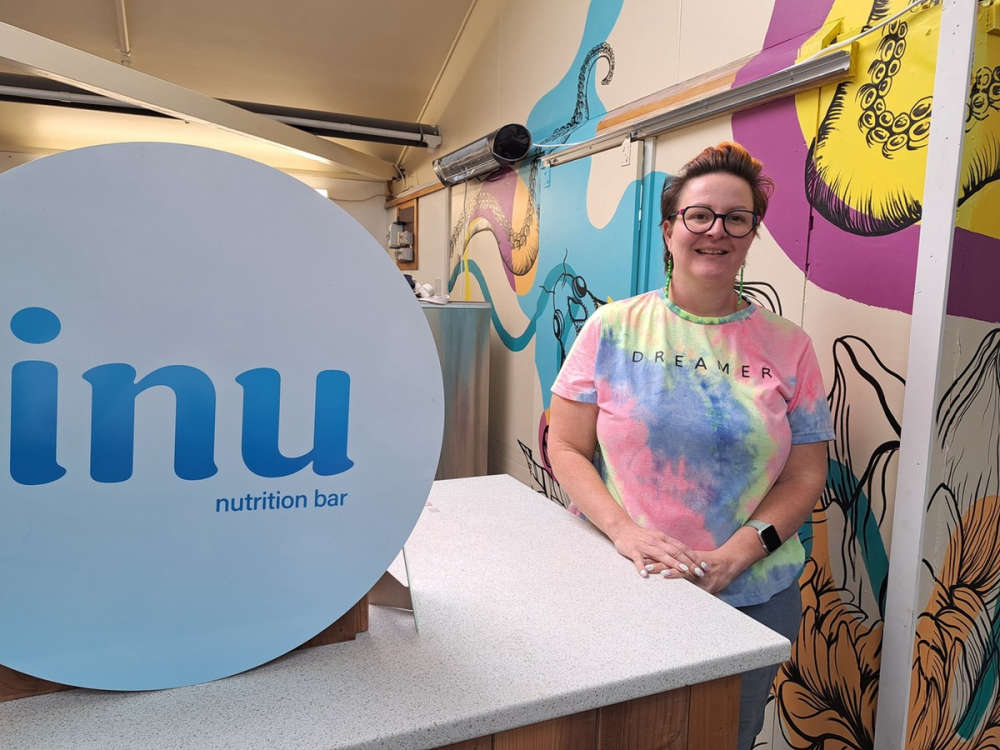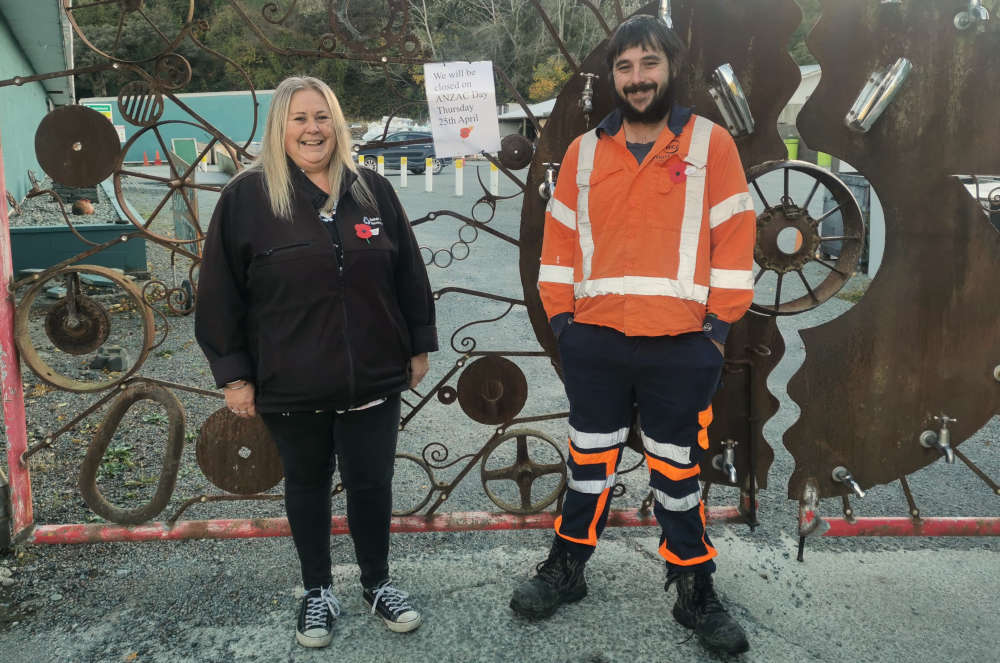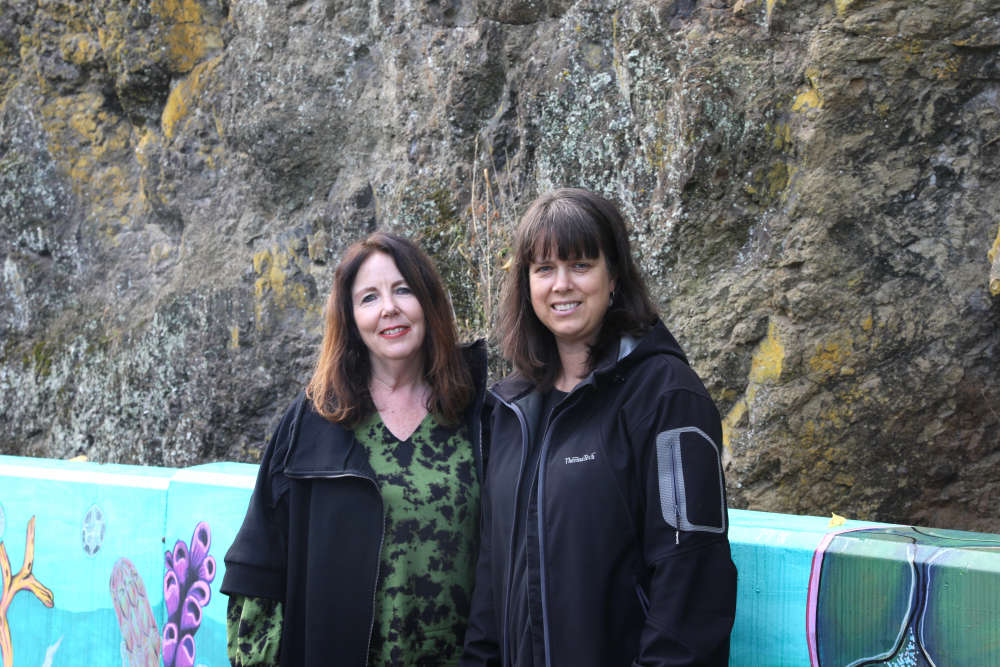
Oamaru artist Luzette Crossan feels like she is being punished for trying to do the right thing, after discovering she will probably need to find another new business premises.
Luzette has a tattoo studio, and has been running art classes and a vinyl printing business, all upstairs at the rear of Thames Arcade since December 2022. But recent steps to add another business into the mix, has brought everything to a halt.
Luzette says it was “no-brainer” when she made the decision to purchase Inu Nutrition off her friend, who had moved to Bali, and run it from her Thames Arcade premises.
The protein shake and “loaded tea” business, which had been based at Ōamaru Harbour, shut in August last year, and had not reopened due to a change in personal circumstances for the former owners.
“I bought it because I am needing to get really good nutrition . . . it's a really good option for me instead of going to a cafe, because I can actually get a good amount of protein in without all the bad stuff.
“And from a business perspective, for me it was a no-brainer because it was really a minimum investment to purchase the business - there was no risk.”
When Luzette looked into the success of similar nutrition bars across Australasia, where they hadn’t worked out, it was because they couldn’t keep up their lease costs and cover overheads.
“For me that was a win already, 'cause I was already doing that. So it was really no risk. It was just kind of like an extra sort of string to my bow.”
Her landlord was supportive of the idea, as long as Luzette covered her own costs installing what was required.
“So I was like, look, that's fine, that's my baby, I can sort that out, and I just made sure that there was nothing really that we needed to know.”
She was told she needed to register the business at the Waitaki District Council. Because customers would be consuming the products, there was still a level of consent required, but it wouldn’t be as “full-on” as a restaurant and a food-handling licence wasn’t necessary.
She understood it to be more of a box-ticking exercise.
Luzette went ahead with buying Inu and renovating the space to accommodate it, and was getting excited about running the nutrition bar.
“It was going to be good . . . and pretty much, I was waiting for a couple of boxes of cups and lids to come in and I needed to go and register at the council. That was the last two things I needed to do before I could open.
“I rang the council on the Monday, registered and got a phone call on the Tuesday from the council to say the building that I'm operating in, and have done for a year and a half, is certified for storage only with intermittent entry in and out, pretty much.
“So, I've been operating with groups of kids up here and people sitting in here for tattoos for 12 hours, and it's not safe for them apparently . . . and yeah, that was that.”
To continue operating any of her businesses, Luzette needs to officially have the use of the building changed, which requires further building consents.
She was advised by a person in the council’s building department that she would need a designer and a fire engineer, and estimates it is likely to cost her about $50,000 worth of expenses.
Getting a fire engineer to come, just to have a look and write up a report, costs about $1500, she says.
“We then know what the report's going to say - you need to reinstate the sprinkler system, you need to fire insulate the floor, you need to make the staircase wider - so it's just, the list just goes on and on.”
She approached her landlord about the issues, but he doesn’t want to spend that sort of money when he won’t be earning the returns to justify it.
“Which I can completely understand. He's been very kind, but I still feel, the longer the process is going on, the more I feel like he should have known.”
Luzette said the person she has been dealing with at the council has also been helpful, but he would not do a site visit so she could show him the space she was working with.
“We asked him ‘would you mind coming up to the space and having a practical look with us at the things that we can do . . . because what you’re asking us to do is not a practical solution’.”
But she was told that was not part of his job.
“For me it’s always been better to have a face to face conversation with someone. Because I think you can really get across your emotions and you can read them as a person and their emotions. I find it really hard to do it over email.
“Definitely the message I’m getting there is, 'I don’t want to say anything that’s going to get me in trouble down the track', which is fair enough, I would be the same.”
Luzette loves the idea of reclaiming empty retail spaces, and having her tattooing studio, art classes and potentially Inu at the end of Thames Arcade was a way of drawing people into the space who might not otherwise go there.
She has put a lot of time and effort into personalising the premises. Her artwork covers the walls, and her tattooing studio is run from a lockable room, so her art pupils can’t get into anything they shouldn’t.
She is now faced with the stress of looking for another premises, which suits all her requirements, and the costs of shifting and re-establishing herself, which has affected her physical and mental health.
As she looks at other potential places, she is striking similar issues. A space can be “certified retail”, but as soon as she needs to put in any sort of partition, shift plumbing, etc, building consent is required.
“Same process over and over again.”
The cost of some leases is also prohibitive. One she looked at is four times more than what she is currently paying.
“So all of a sudden you're running that risk. That becomes a risk. My whole business becomes a risk that I can't afford and I can't sustain.
“So that's pretty much the same story with all the empty buildings that I've looked at in town. All of them,” she says.

Running art classes for children is a major part of Luzette's business, which she runs from the Thames Arcade. Photo: Supplied/Facebook
“I think that a lot of people don't know. Well, I certainly didn't know, as a normal, local Ōamaru person. I just looked at all the empty buildings and thought, ‘oh my gosh, this is so depressing’, without actually realising the back story about how hard it is to get into these buildings and operate.”
Luzette met with council Placemaking lead Cyndi Christensen and Business and Growth Enterprise lead Rebecca Finlay who both agreed it would be a shame to lose the business from its current space and acknowledged the frustration of the situation.
Cyndi had been involved in an earlier meeting between the council, some property owners and real estate agents, and there are lots of issues with lots of buildings, she says.
“We want to find a way where we can help people through this. We don’t know what those answers are yet, but yeah.”
In October last year, the council decided to move into the “implementation” phase of its Transformation plan.
Chief executive Alex Parmley described it at the time, as an approach that is “people-centred, that builds relationships, favours depth over breadth, and engages diverse communities”.
Cyndi said as part of Transformation, the council is looking at changing the way building consent inquiries are handled.
“You would have, like, a case manager assigned who would make sure that you were speaking to the right people who were able to get you the outcomes that you wanted. It's just a shame that we're in this situation now.”
Luzette has been reluctant to speak out on the issue or ask for help. She is not one to complain.
“I just want to do my thing and earn money for my family, and have a service.”
But the three agree it is businesses like hers, which provide services that can’t be bought online, that will keep people coming into the town centre.
Things have reached the point where Luzette is starting to notice the financial impact of not being able to run her business as she usually would.
“The point where I'm at now is at the end of term, which normally means that I start working hard on signing up for art classes for next term. But because I can't be here anymore, I can't do that.
“So now I'm looking at about a $3,000 loss for next term because I can't operate that part of my business.”
The council has not given her a time frame for when she needs to stop operating by, she says.
“But now that I know, I can't not know.”
She has also held back from advertising school holiday art classes, because she is worried it might not be safe.
“Normally school holiday programmes are a lot busier. There's more like 20-odd kids up here for each class, and it’s just too many for me to feel safe now, like it's really weird because I've, I've had it so many times before and it's been fine.”
Cyndi says what Luzette is going through is not uncommon, and is the perfect example of a situation where the council needs to work in a more “transformational way - more efficient and not as cost-consuming as in the past”.
There are a lot of things councils have to do because of government regulations that are out of its control.
“It’s how do we make the process function better, because the impact is so much bigger than our individual teams. You know we can only make the CBD revitalised if we’re all working towards that together,” Cyndi says.
“We want to work collectively and collaboratively with the community, and we have to look at all these things - it’s not just about the shiny, fancy stuff - and there may be some things that we can’t change, but I think there’s great value and there’s certainly a strength in being able to have a conversation to understand the other side of it.
“We’re on each other’s team, but sometimes it doesn’t feel like that,” Rebecca adds.
“Everybody has a specific role at council and that’s to a degree what Transformation is trying to fix, is make sure those roles have that connectedness between them, so that we’re achieving that outcome, which is like Team Waitaki.”
The Economic Development team’s role is to make sure there is economic vibrancy, growth, and to ensure businesses are thriving and sustainable, she says.
“Then obviously our colleagues in building or planning - they have to protect the ratepayer and they have to protect the assets within the community, but it’s working out, 'well what can we do from an economic development perspective that’s going to work more collaboratively with those departments'.
“The other thing I think we need to recognise is, lots of these departments are enforcing a central government mandate through the local government.
Rebecca says she thinks one of the pieces of transformation is enabling everybody at council to feel confident and secure in their roles.
“That, kind of, feeling of fear of mucking it up is massive.”
Following on from Luzette’s meeting with Cyndi and Rebecca, there are plans for a round-the-table discussion between her, her landlord and the necessary people at council, to try and reach a resolution, Cyndi says.
So watch this space.



 Anzac Day clean sweep for Oamaru
Anzac Day clean sweep for Oamaru
 Waitaki Whitestone Geopark Trust appoint new general manager
Waitaki Whitestone Geopark Trust appoint new general manager
Comments
Add a comment